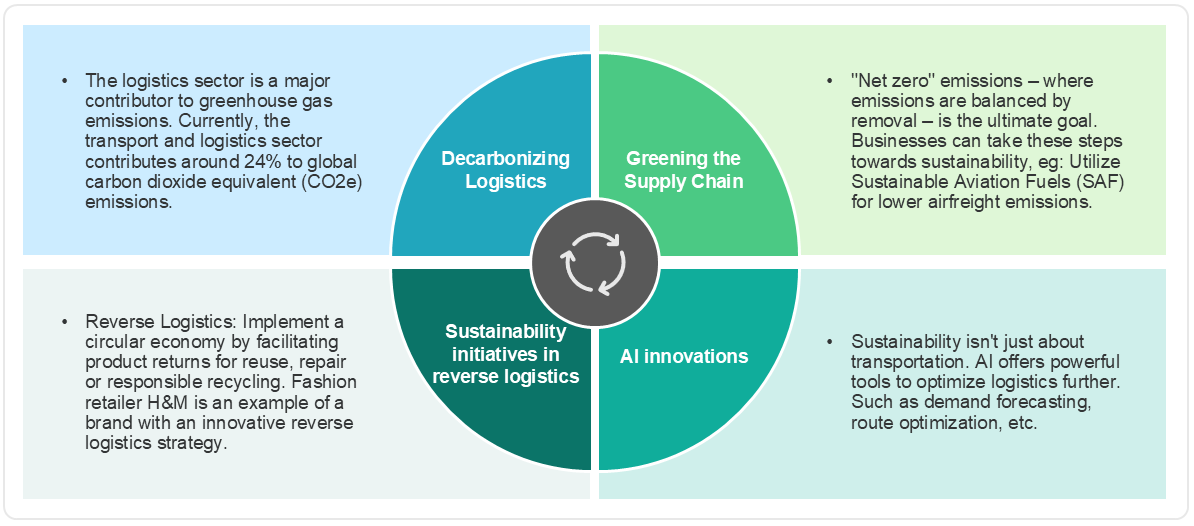
As consumers and businesses become increasingly environmentally conscious, the logistics industry stands at a pivotal crossroads. Imagine a bustling logistics hub—efficient, clean, and powered by renewable energy. Electric trucks glide silently along optimized delivery routes, significantly reducing fuel consumption and slashing carbon emissions. With sustainability taking centre stage in modern logistics, this vision is rapidly transforming from aspiration to reality.
To fully understand this shift, it is essential to differentiate between ‘sustainable logistics’ and ‘sustainability in logistics.’ While these concepts are closely related, they possess distinct meanings. Sustainability in Logistics refers to the practical steps businesses take to enhance their sustainability practices. In contrast, Sustainable Logistics encompasses the broader vision of minimizing the environmental footprint of the logistics sector.
Consider this distinction: Sustainability in Logistics focuses on tangible actions that companies implement daily to become more eco-friendly—such as transitioning to renewable energy sources, optimizing delivery routes, and reducing emissions. Conversely, Sustainable Logistics represents the overarching goal of creating a logistics system that is both efficient and environmentally responsible. It envisions a future where the movement of goods does not compromise our planet’s health.
The term ‘sustainable’ is crucial; when paired with ‘logistics,’ it unveils a realm of possibilities. Today, we observe a growing trend of businesses integrating sustainability into their logistics strategies. However, the sector faces an urgent challenge—it is sitting on a sustainability ticking time bomb. Let’s delve into the criteria, trends, and benefits of making logistics more sustainable.
The Three Pillars of Sustainability
1
Environmental (Planet):
Focused on reducing carbon footprints and minimizing waste.
2
Social (People):
Involves supporting various stakeholders and promoting social equity.
3
Economic (Purpose and Profit):
Addresses profitability while adhering to regulations and accountability.
The Sustainability Time Bomb in Logistics
The logistics sector is under immense pressure from multiple fronts:
- Customer Demand: Both customers and vendors are increasingly seeking sustainable solutions within their value chains.
- Investor Expectations: Major investors are prioritizing ESG (Environmental, Social, and Governance) criteria in their decision-making processes.
- Stakeholder Concerns: There is heightened awareness regarding climate change and sustainability among stakeholders.
- Regulatory Pressure: Growing demands for transparency and reporting due to regulatory requirements.
- Competitive Advantage: Sustainability offers opportunities for differentiation while intensifying competitive pressures.
Sustainability in Logistic Trends 2024

The Future of Sustainable Logistics
Looking beyond current trends, several key developments are anticipated in the realm of sustainable logistics:
- Innovative Technologies: Continuous advancements in blockchain, IoT, and AI will support sustainability initiatives.
- Circular Economy Models: A shift towards closed-loop systems that prioritize recycling and resource reuse.
- Collaborative Networks: Increased efforts to share best practices and enhance supply chain effectiveness across businesses.
- Evolving Policies: Governments worldwide will enforce stricter regulations that compel businesses to adopt environmentally friendly practices.
- Customer Empowerment: As consumers grow more environmentally conscious, their purchasing decisions will increasingly influence sustainability efforts in logistics.
Benefits of Sustainable Logistics
Embracing sustainable logistics yields numerous advantages:
- Increased Profit Margins: Cost reductions from eco-friendly practices lead to enhanced profitability over time.
- Improved Brand Image: Companies prioritizing sustainability are viewed positively by the public, attracting top talent and new business opportunities.
- Market Leadership: Organizations committed to sustainability set benchmarks for the industry and gain a competitive edge.
- Risk Mitigation: Proactively implementing sustainable practices helps businesses navigate regulatory changes effectively.
- Global Impact: By reducing carbon emissions on a global scale, companies position themselves as leaders in the fight against climate change.
The logistics industry is increasingly adopting sustainable practices to address social, economic, and environmental challenges. The drive to differentiate from competitors, meet investor expectations, and comply with regulatory demands fuels this transformation. Prioritizing sustainable logistics not only benefits the planet but also enhances profitability and strengthens stakeholder relationships. By making sustainability a cornerstone of your strategy, you are not merely adapting to change; you are leading it toward a future that is more profitable, reputable, and sustainable.
Contact us to explore how our expertise can assist you in achieving your objectives.




